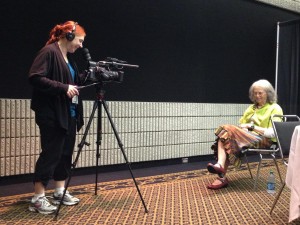
Brigid Maher conducts an interview for her upcoming film about midwives working in the hospital system
With growing consensus about the importance of social impact in documentary filmmaking, many major funders: The Fledgling Fund, Pare Lorentz Doc Fund, and Tribeca Film Institute, among others, now require outreach campaigns be included in their grant outcomes. Can successful impact strategies can be catalysts for attitude and behavior change? American University Professor Brigid Maher, Producer/Director of The Mama Sherpas, developed a trial impact study to evaluate society’s thoughts on midwifery; dispelling myths and altering mindsets about nurse-midwives and their practice. Maher, along with Maria Ivancin, professor in the School of Communication at American University, developed a methodology for (1) determining audience’s preconceived thoughts of midwifery and (2) understanding how audience’s attitudes and behaviors toward midwifery changed after viewing the film.
Missing Link in Measuring Impact
Maher and Ivancin included a key dynamic in their impact study – incorporating user-focused research to address the challenge in using film as a tool toward networked advocacy and awareness-building. Maher, Ivancin and team administered two surveys: one online link to the general public and another to respondents post screening. The data not only helped refine the film from rough cut to fine cut by determining audience’s understanding of main themes, but also sparked conversations in social reform.
Data Becomes A Catalyst
The online survey measured the general public’s knowledge of and attitude toward midwifery. Maher and Ivancin noticed a sharp disconnect between perceived knowledge of midwifery and actual attitudes toward the practice. Though most respondents claimed to be “somewhat familiar” with midwifery, perceived knowledge of the topic starkly affected their attitude and belief; a majority said they were “not at all likely” to recommend a midwife to someone who is pregnant.
The post screening survey, given to respondents who attended one of five community screenings in Washington D.C., measured audience’s level of familiarity/knowledge of midwifery in the United States, along with their attitudes toward midwives and their practice. Respondents who viewed the film had a more favorable opinion of midwives and were better informed about their capabilities. The film helped a large majority of respondents learn a lot about midwives and midwifery. Almost half of whom reported they were “very likely” to recommend a midwife to someone who is pregnant. In fact, almost every respondent stated they would be “very likely” to recommend the film to someone who is expecting a baby.
What’s Next?
The quantitative and qualitative data collected from the study yielded exciting outcomes for The Mama Sherpas’ trial impact campaign – respondents who viewed the film reported adjusted, positive attitudes toward midwifery. Maher is currently expanding her impact study to a broader audience. The Mama Sherpas film is coming soon.
You can meet Maher and learn more about the project this Friday at the 11th annual Media That Matters conference. She’s moderating a panel on “Impact Design: From Production to Measurement.”
